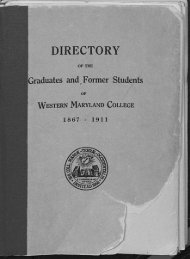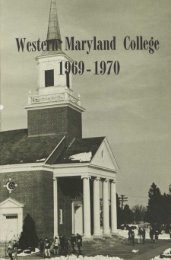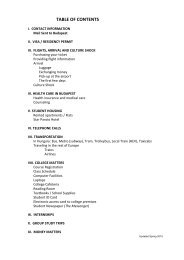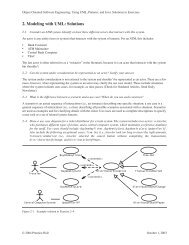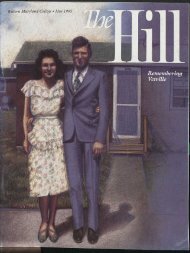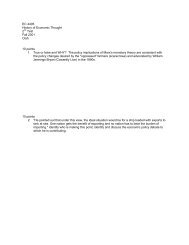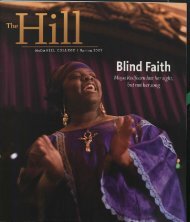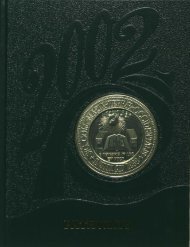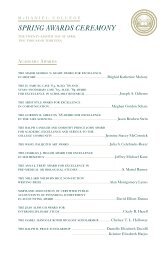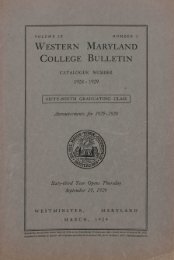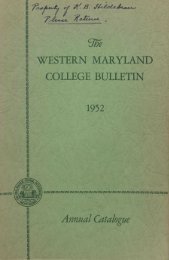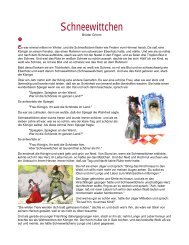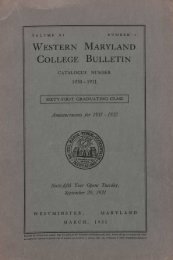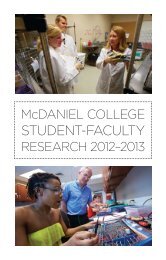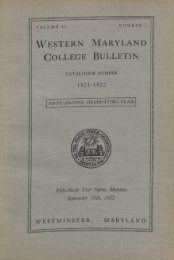You also want an ePaper? Increase the reach of your titles
YUMPU automatically turns print PDFs into web optimized ePapers that Google loves.
95,000. In science alone, 55,000 journals, 60,000books, and 100,000 research monographs are p~blishedannually.) In such a situation, fragmentationseems inevitable.Probably the most frequently heard cry abo~tprofessors nowadays, even at the smaller colleges, LSthat they are so research-happy that they neglectteaching. "Our present universities have ceased to beschools," one graduate student complained in theHarvard Educational Review last spring. Similar-chargeshave stirred pulses at American colleges and universitiescoast to coast, for the past few years.No one can dispute the assertion that researchhas grown. The fact is, it has been getting more andmore attention since the end of the NineteenthCentury, when several of America's leading universitiestried to break away from the English collegetradition of training clergymen and gentlemen,primarily through the classics, and to move towardthe German university tradition of rigorous scholarshipand scientific inquiry. But research has proceededat runaway speed since 1950, when theFederal Government, for military, political, economic,and public-health reasons, decided to supportscientific and technological research in a majorway. In 1951 the Federal Government spent $295million in the colleges and universities for researchand development. By 1965 that figure had grownto $1.7 billion. During the same period, privatephilanthropic foundations also increased their supportsubstantially.At bottom, the new emphasis on research is dueto the university'S becoming "a prime instrumentof national purpose," one of the nation's chief meansof maintaining supremacy in a long-haul cold war.The emphasis is not likely to be lessened. And moreand more colleges and universities will feel itseffects.BUT WHATABOUTeducation=sue teachingof young people-that has traditionally been thebasic aim of our institutions of higher learning?Many scholars contend, as one university presidentput it, that "current research commitmentsare far more of a positive aid than a detriment toteaching," because they keep teachers vital and atThe push to do research:Does it affect teaching?the forefront of knowledge. "No one engaged in researchin his field is going to read decade-old lecturenotes to his class, as many of the so-called 'greatprofessors' of yesterday did," said a teacher at a universityin Wisconsin.Others, however, see grave problems resultingfrom the great emphasis on research. For one thing,they argue, research causes professors to spend lesstime with students. It also introduces a disturbingnote of competitiveness among the faculty. Onephysicist has put it this way:"I think my professional field of physics is gettingtoo hectic, too overcrowded; there is roc much pressurefor my taste .... Research is done under tremendouspressure because there are so many peopleafter the same problem that one cannot afford torelax. If you arc working on something which 10other groups are working on at the same time, andyou take a week's vacation, the others beat youand publish first. So it is a mad race."Heavy research, others argue, may cause professorsto concentrate narrowly on their disciplin.eand to see their students largely in relation to Italone. Numerous observers have pointed to theprofessors' shift to more demanding instruction, butalso to their more technical, pedantic teachi~g.They say the emphasis in teaching may be movingfrom broad understanding to factual knowledg~,from community and world problems 10 each discipl~ne'stasks, from the releasing of young people'sminds to the cramming of their minds \.... ith the stoffof each subject. A professor in Louisiana has said,"In modern college teaching there is much moreof the 'how' than the 'why.' Values and fundamentalsare too interdisciplinary."And, say the critics, research focuses attention onthe new, on the frontiers of knowledse and tends to~orget the history of a subject or :h~tradition. ofl~tellectual inquiry. This has wrought havoc Withliberal arts education, which seeks to introduceyoung people to the modes, the achievements, the



